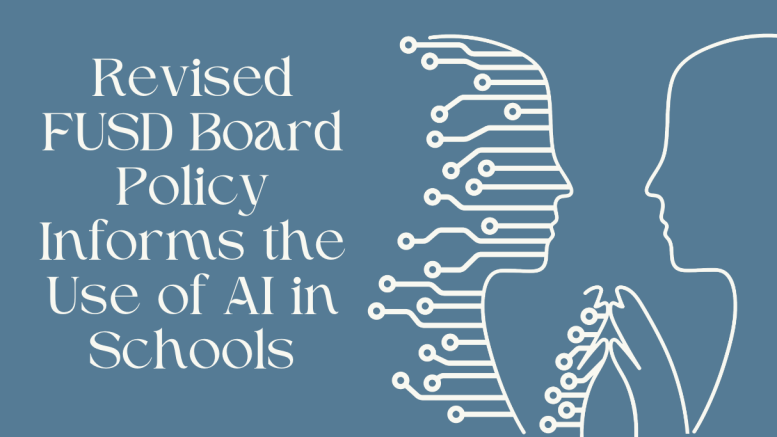By Staff Writers Warren Su & Aarav Vashisht
Following a surge in reported cases of academic dishonesty and an increase in AI use across the district, FUSD has adopted stricter academic integrity policies regarding the use of technology in classroom settings, explicitly prohibiting the submission of AI-generated work for assignments intended to be completed individually.
Specifically, on June 25, the FUSD Board of Education approved a second reading of revised Board Policy 5131.9, which covers academic honesty concerns. The revision prohibits the use of technology solely for completing coursework and generating answers to mathematical, scientific, or analytical problems for students. This policy aligns with the California Department of Education’s (CDE) perspective on the responsible and ethical use of AI. According to the CDE’s website, the CDE is “committed … to educate [administrators and educators] about AI’s benefits and limitations,” in line with the State Superintendent of Public Instruction’s learning initiative.
Meanwhile, some MSJ teachers have expressed skepticism about whether AI is a tool permitted for regular use. “Large Language Models (LLMs) [models that power chatbots like ChatGPT] are not neutral … the last thing that we should be doing is ceding any kind of authority to them,” English Teacher Brian Rath said. According to a 2025 analytical study conducted by OpenAI, faults arise when AI algorithms undergo pretraining, a process in which the algorithm learns through large amounts of data. Some errors, such as proper spelling or grammar, can be minimized through large datasets, but false, obscure facts can creep their way into the algorithm. Although engineers attempt to eliminate errors, AI models are still prone to making factual errors, especially when it comes to low-frequency facts that may be incorrect.
By contrast, other members of the MSJ community remain optimistic about AI. “I think some teachers are actually encouraging the use of AI … colleges and universities are now doing that too, so that is my hope for our school,” Principal Amy Perez said. Chatbots can be especially useful for their ability to quickly generate vast swaths of information. For example, Junior Yekta Mousavi “use[s] it to gather ideas and brainstorm … [and] it’s also useful for teaching concepts my teachers don’t explain well.”
For teachers like Science Teacher Karrie Ware, AI is a tool that can be beneficial, but it should not be used without caution. “I think human-to-human [interaction] is really important. That’s the other reason why I think we should be very judicious in rolling out AI [tools], because we’re too likely to try to replace … human mentorship with technological mentorship. And I don’t know that AI has earned that right,” Ware said. According to a 2015 study published in the American Journal of Lifestyle Medicine, social interaction can significantly contribute to health and improve well-being. Despite AI’s increasing popularity and utility, many school officials argue that human connection is vital to one’s development in life, especially in the context of education. “Students need to learn how AI can help them learn better, but not take the place of their learning,” Assistant Principal Beth Bonomo said.
Voices
“I think human to human is really important. That’s the other reason why I think we should be very judicious in rolling out AI, because we’re too likely to try to replace human interaction and human mentorship with technological mentorship. And I don’t know that AI has earned that right.” — Science Teacher Karrie Ware.
“Large Language Models are not neutral … the last thing that we should be doing is ceding any kind of authority to them,” — English Teacher Brian Rath.


Be the first to comment on "Revised FUSD Board Policy Informs the Use of AI in Schools"